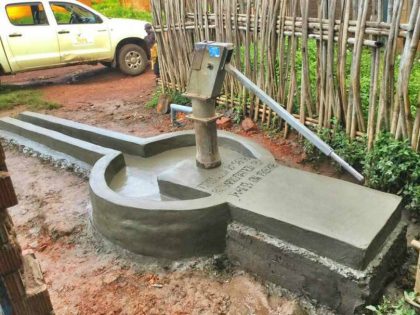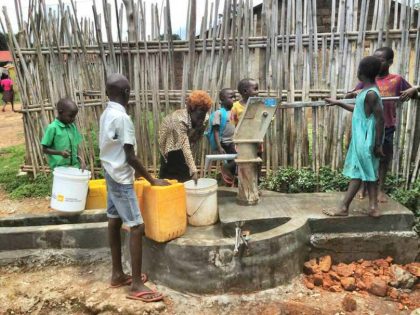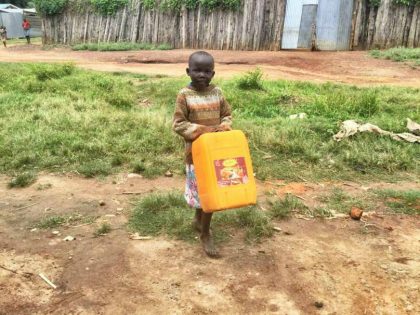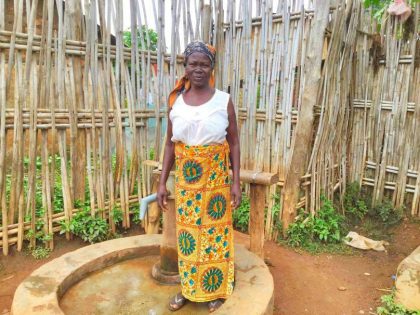Part 4 of Phase 4 in the South Sudan Well Rehab Program
The last 5 wells of the 20!
These 5 well repairs have been finished in the South Sudan Well Rehab Program Phase IV. Follow the link for an overview of the program.
Water Charity’s 20 South Sudan Relief Wells (with Conclusion Reports)
16. Lomuku 3
Lomuku 3 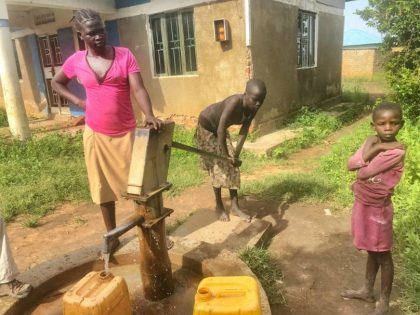
Lomuku 3, Yei River State, South Sudan
Community Description
There are several wells in the area called Lomuku as it is a large community outside of the city center. Water Charity has previously restored other wells in the Lomuku area and since then, Lomuku 3 a densely populated community, was heavily hit with the crisis last year. The roads to get to Lomuku 3 are difficult to pass especially during the rainy season. It is located 5 kilometers from the city center.
Problem Addressed
In 2017, SPLA-IO, (Sudan People’s Liberation Army In Opposition) raided Lomuku 3 sending the community members into the bush, to neighboring communities or to Uganda to seek refuge. The property was damaged and the well left abandoned is in need of repair. The GI pipes are rusted, the hand pump is loose, and the bearings need to be replaced.
Now that peace has returned to Lomuku 3, community members who have all experienced trauma are returning, resettling, and trying to restart their lives again back home. Relocating is very difficult to do without access to clean water that they are used to getting from this well. The water is corroded with rust and only works after pumping for long periods of time. The water leaks from the pump head and the base of the platform are in need of repair for the runoff water to properly drain.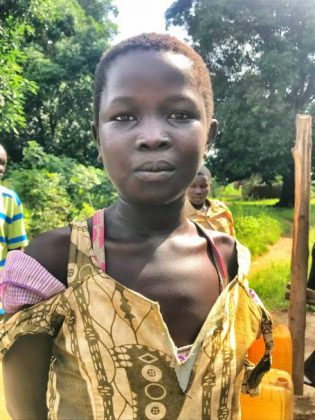
Cicilia Sitima is 21 and says there are 21 people in her family consisting of her brothers and sisters, parents, grandparents, and her cousins that her family has taken in. This is the reality for many families in South Sudan. Children who have lost their parents either due to sickness or injury because of the conflict are taken in by their extended family members.
Cicilia says the members of the well committee left during the crisis have yet to return. Once the well is repaired, a new committee will be trained to maintain the borehole and will give them a sense of ownership and purpose once again.
Project Impact
Access to clean water meets a fundamental need that will bring health and give those children who find themselves adjusting to a new family dynamic the capacity to adapt to their new routine. Having to find water to survive physically while having to deal with emotional trauma is more than any child should bear. Clean water in this village will bring physical healing to community members leaving room for healing in other ways. This is crucial as they work hard to resettle. This project will serve the estimated 1000 currently in the community and hundreds more that are returning each week.
Conclusion Report
The repair of the Lomuku 3 well took two days to repair. Metal bearings, the pump handle, and several corroded GI pipes were replaced, and the foundation wholly restored.
Lomuku 3 was devastated during the conflict. Mostly all of the community members fled and many children now live with extended family members. All have experienced trauma. Now that peace has returned, and people are returning, a restored well brings hope and relief as they work to heal physically and emotionally.
The well technicians met with the community members that were present for the repair and discussed how they would rebuild their well committee which is vital for the upkeep and maintenance of the well. Two of the community members that were on the committee have recently returned and are working to assign other community members to the committee.
This project will serve the estimated 1000 currently in the community and hundreds more that are returning each week.
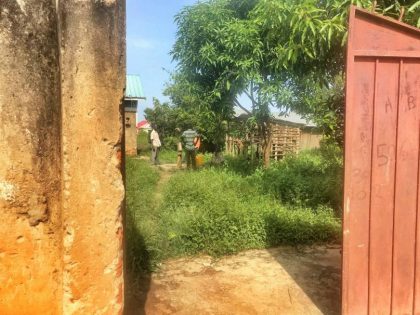
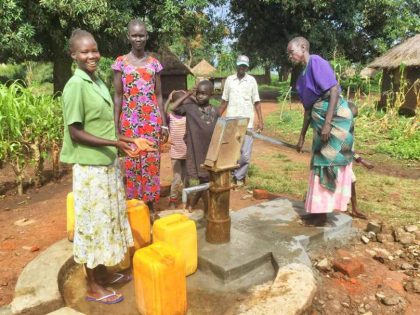
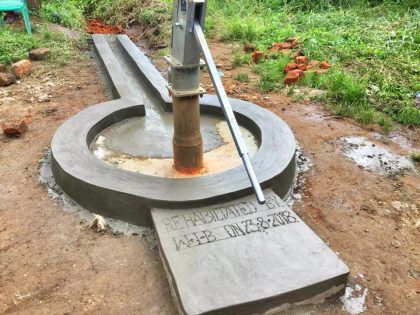
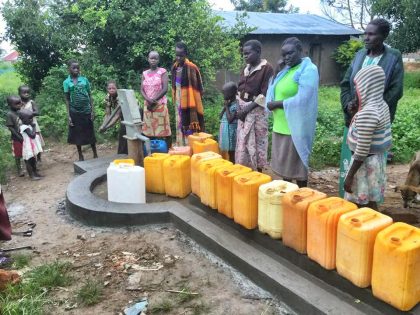
17. Harvesters
Location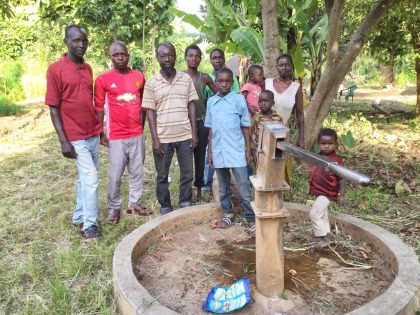
Harvesters Community, Yei River State, South Sudan
GPS- N 04* 07.072 E 30* 39.509
Community Description
Harvesters Community is located 3.5 miles from town and is close to EPC Harvesters Orphanage on the Yei-Maridi road. Harvesters Community is the area where Bishop Elias Taban, Water is Basic South Sudan Director was hidden in the grass for three days on May 5, 1955, from the very hour of his birth. This was the day that the First Sudan Civil War broke out.
The well in this community was first drilled in 1979 for a Ugandan refugee camp. It served Ugandans who fled their country during the fall of President Idi Amin.
This community has a population of 130 family heads and an average of 780 people.
Problem Addressed
The Harvesters Community well is over three decades old. There have been parts replaced over the years, but with the worn materials, the well technicians determined that this well is in need of a complete renovation for it to run correctly.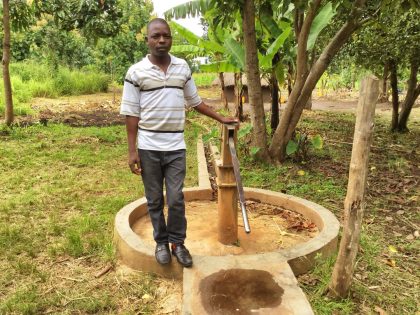
Mr. Salah John, the Chairperson of the well is married with one child. At the beginning of 2017, the SPLA-IO (Sudan People’s Liberation Army-in Opposition) occupied the area surrounding the community. Because of the presence of the IO, Salah said it became increasingly dangerous for anyone to travel outside of the village. On several occasions, conflict occurred within their community forcing many members to seek security elsewhere.
When the well fell into disrepair, community members had no choice but to journey outside of their area into the unsafe territory to seek water. Many in the community have extended family members who are teachers at Harvesters Orphanage located across the main road. The teachers who live within the gated school grounds, relatively safe from outside conflict, were able to invite their families to reside at the orphanage with them. But Salah and his small family along with many others remained.
Juma, another committee member of the well, shared how difficult it was for them to use the well in its current state. The water barely trickles out taking 30 minutes of pumping to fill one jerry can. He was proud to share how his community is healing as many are returning home and they no longer struggle with insecurity. While it is now secure for them to travel the Yei-Maridi road to seek water in other locations, the closest source is the dirty waterhole down the road. Naturally one would prefer to walk a longer distance to pay a fee for clean water from another well, but the reality is, when resources are scarce and so is time to care for your family, you get water where it is most convenient most days.

Project Impact
It will take time for this community to heal, but clean water is the first step in providing the space for them to be able to focus on rebuilding their lives. The restoration of the Attende Community well will benefit an estimated 720 people.
Conclusion Report
This 30-year-old well was in need of extensive repair work. GI pipes were replaced as were many corroded parts. The foundation of the well was completely restored. This was difficult and took three days as the rains were persisted while the team was working. Juma, a committee member of the well, worked hard to help the team and secured a tarp for their work to continue. Juma is proud to have a functioning well for his community as they seek to heal both physically and emotionally from the recent conflict.
The restored Harvesters Community well allows 130 families that reside in the area to have clean, safe water leading to better health and more time to attend to their work and their families.
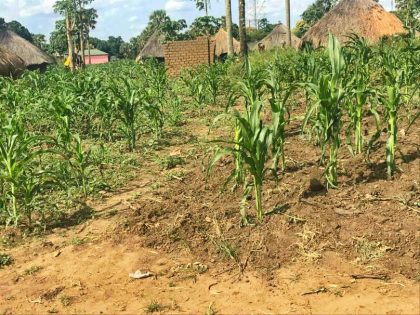
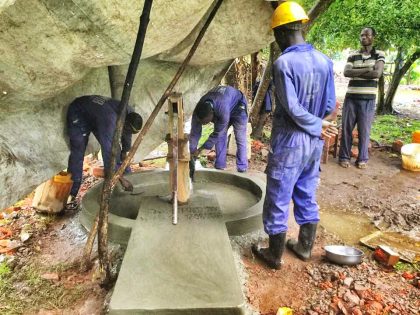
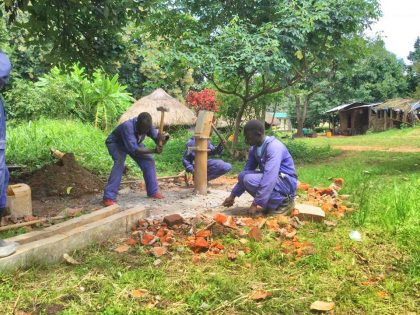
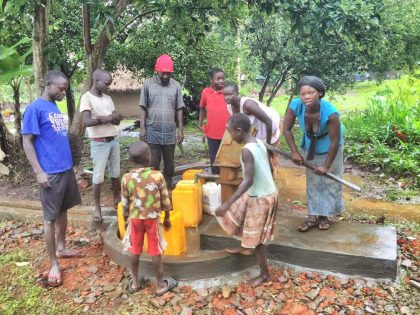
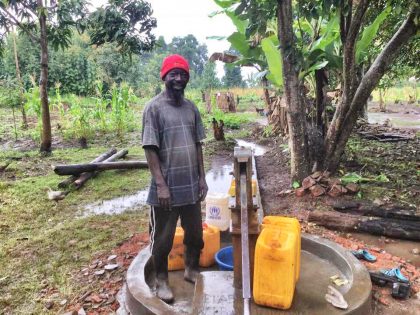
18. Attende
Location 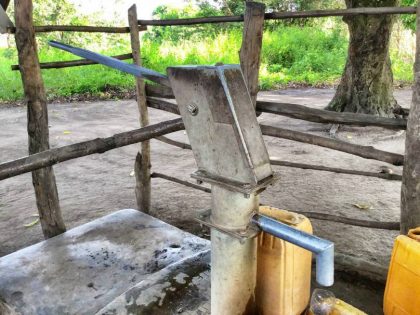
Attende Community, Yei River State, South Sudan
GPS- N 04*05.078 E 30* 41.283
Community Description
6 miles from town on the Yei to Juba Road. Currently, there are 120 family heads with an average of 720 people residing in the Attended Community.
Problem Addressed
Rupas Wani is the Chairman of the well at Attende Community. Rupas said that they have had to rebuild their well committee because six out of their team of eight were displaced by the conflict over the past year. Like most everyone in South Sudan, Rupas and his family have experienced trauma either because of what has happened to them or because of what they have seen.
The well fell into disrepair because for a time, the entire village was abandoned, and it went for months with little to no use. Before the June 4th grassroots peace agreement was signed, rebel factions that remained in the villages created chaos and insecurity. Rupas stayed close to the well but often slept in the bush for fear of his home being raided.
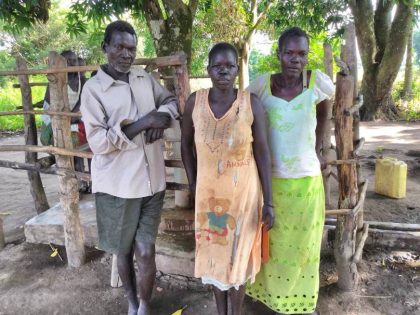 The well produces water only after pumping for over 10 minutes. Initially, the water that flows is brown with rust. Like many wells in the area, the team assesses that it will need a complete restoration and replacement of all of the GI pipes.
The well produces water only after pumping for over 10 minutes. Initially, the water that flows is brown with rust. Like many wells in the area, the team assesses that it will need a complete restoration and replacement of all of the GI pipes.
Currently, the 3 well committee members are relieved that they will once again experience the benefit of clean, fresh water at this well that they will soon be able to pump with ease. Their goal is to rebuild a committee of 8 members who will establish fees to be collected, a schedule of usage and a plan to maintain the well now that security has returned to their area.
Project Impact
It will take time for this community to heal, but clean water is the first step in providing the space for them to be able to focus on rebuilding their lives. The restoration of Attende Community well will benefit an estimated 720 people.
Conclusion Report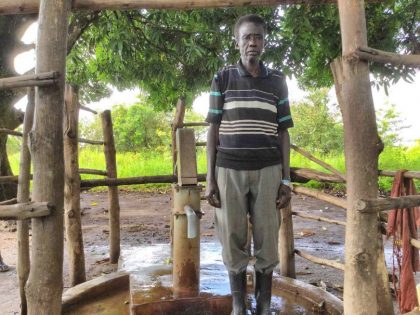
When the Water is Basic well technicians returned to the Attende Community well for repairs, they were greeted by a new well committee that was excited to have access to clean, fresh water once again. After the WiB team initially assessed the need, the three remaining committee members went right to work training new members and assigning new roles. The new committee consists of 3 men and four women who understand the importance of an active committee to maintain their well.
It will take time for this community to heal, but clean water is the first step in providing the space for them to be able to focus on rebuilding their lives. The restoration of Attende Community well benefits an estimated 720 people.
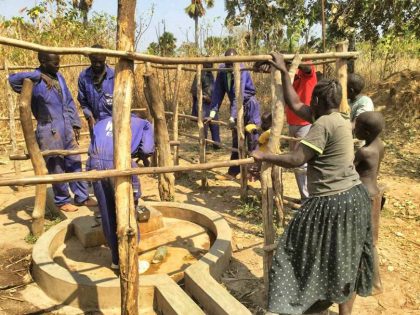
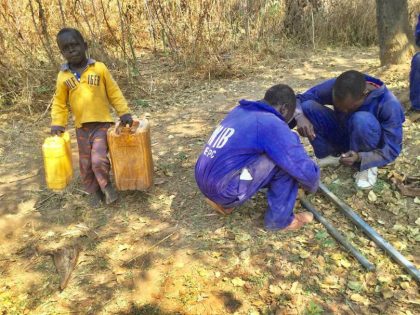
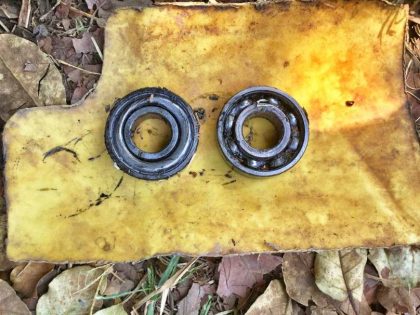
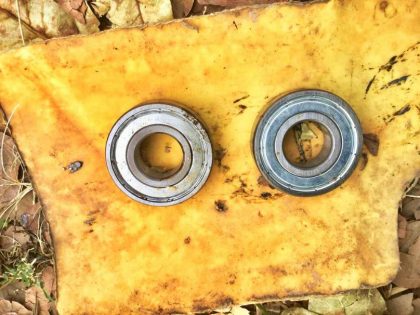
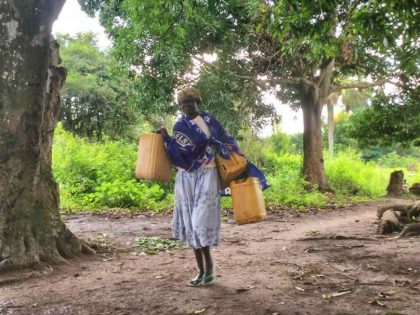
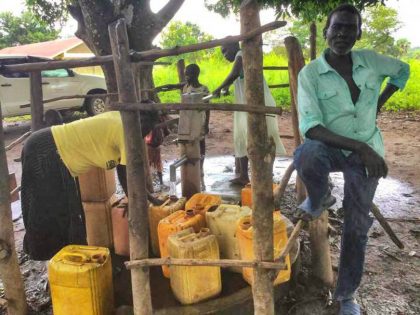
19. Marakonye
Location
Marakonye, Yei River State, South Sudan
GPS- N 04*06.191 E 30* 42.819
Community Description
Marakonye is located 4 miles from town on the Yei to Juba Road in the heart of Yei’s teakwood forest.
Problem Addressed
The committee members of the Marakonye Community well reached out to the Water is a Basic team when their well fell back into disrepair. Water is Basic in partnership with funding by Water Charity restored this well a year ago when the well was not producing water at all. The well technicians replaced GI pipes with holes that corroded through with rust. Because of massive amounts of wells to be restored and a limited number of suppliers to stretch to meet the need, the team was repairing only the parts that needed to be replaced for the well to once again function properly.
Working hard to maintain their well, the committee members established fees to collect and a schedule for the well to be in operation. But the reality of the continued conflict in Yei means that so many are in desperate need of water and do not have the fees to pay. Therefore, fees are no longer collected, and the well is opened all hours of the day. Everyone in most areas of South Sudan is working to support and help one another, especially when it comes to the basic need for clean water. 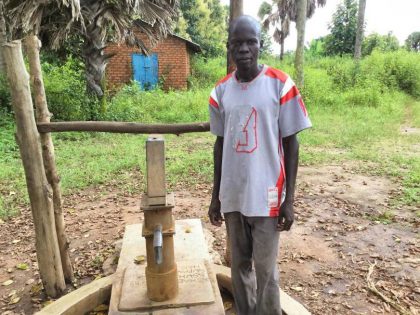
Our team was once ahead of the curve in moving towards well rehab in South Sudan. Thousands of wells have been drilled over the last 60 years, and most need service. Since the war broke out in December 2013, the people of South Sudan have been on the move both as refugees and IDPs. Some wells were left with no water committee and little use leading to damage and rust, for others, where people have felt safe or found some food, that meant dramatic overuse leading to damage as well. Most well rehabs will last for years with occasional bushing replacements. Unfortunately, we see ourselves repairing many wells where the GI pipes have rusted because of lack of use and now others where more than 4,000 people are trying to use them well. Until full peace and full food production return to South Sudan we expect to rehab wells at a pace of one every day and entirely expect to rehab some wells more than once in a year. We are considering doing a full restoration of wells and replacing all of the parts which will increase cost moving forward. As of now, we have been replacing damaged parts. Because this will be the second time in two years that this well needs to be repaired, our team will do a complete restoration replacing all parts.
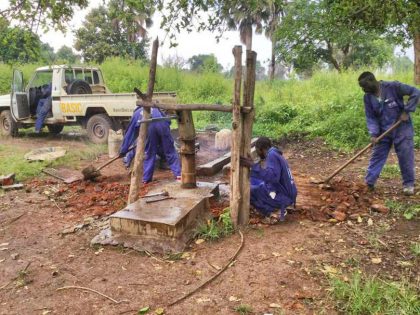
Mandela Alison, the committee chair of Marakonye Community well was once displaced into the bush in fear of government forces. A grassroots peace agreement was signed in July of 2017 in Yei between SPLA (Sudan People’s Liberation Army) and SPLA-IO (Sudan People’s Liberation Army-In Opposition). During that time, some rebel factions refused to join the agreement and became divided into the villages fighting amongst themselves and killing and raping innocent civilians. But Marakonye is a government-controlled area and since the agreement was signed has experienced peace and returned stability. Because of this Mandela, his family and hundreds of others have returned home to Marakonye where the population is growing daily.
Mandela says that the water the well currently is producing is brown and so the team asses that all of the GI pipes will need to be replaced.
Project Impact
The complete restoration of Marakonye well will be a source of life to all who have returned and are resettling to the area. All have experienced a trauma of some sort and are relieved to return to peaceful conditions. But without clean water from their well, they must travel long distances to neighboring communities for water where often fees are collected that many cannot afford. A restored well will bring restored hope and help them as they rebuild their lives, returning to work, school, and family.
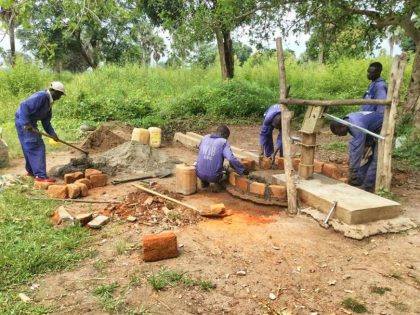 Conclusion Report
Conclusion Report
The Water is Basic team restored all of the GI pipes except for the ones that were replaced a year ago. With all of the GI pipes new or less than two years old, and a new foundation, the Marakonye will provide clean, fresh water for the community of Marakonye into the next decade.
The women at the well were so grateful as the well was being restored anticipating more comfortable days ahead as they will no longer need to walk to neighboring communities to pay high fees for water. They were working alongside the team, cleaning the land surrounding the well.
This well is estimated to serve 1000 people.
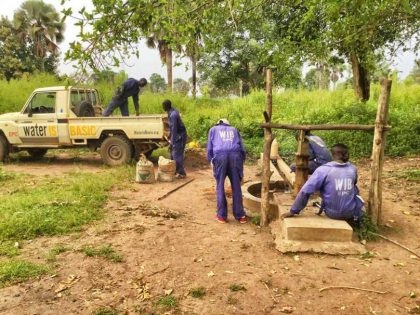
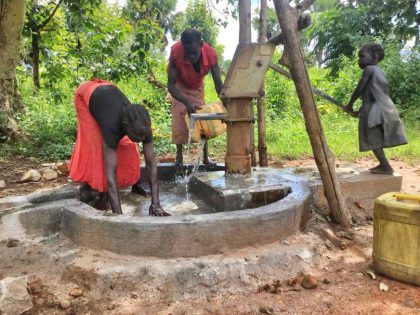
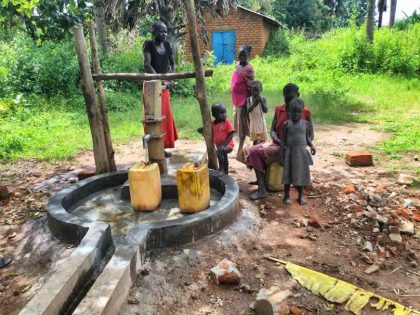
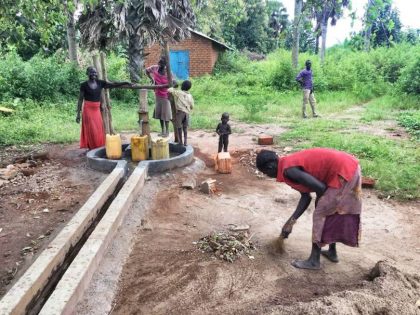
20. Kanjoro
Location
Kanjoro Community, Yei River State, South Sudan 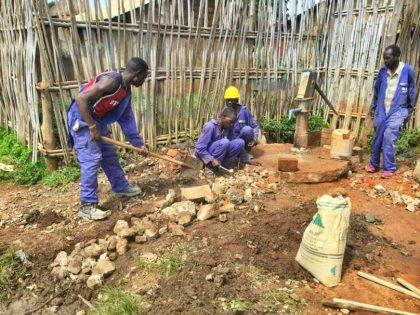
GPS- N 04* 05.704’ E. 30* 41.287’
Community Description
Kanjoro community has 160 families with an average of 960 people. It is located 1.5 miles away from the town center of Yei.
Problem Addressed
Yawa Christiana was interviewed at the Kanjoro Community well. She is a woman of great strength who is one of the well committee members, mother of five children, grandmother of 6 and an experienced seamstress. Yawa Christiana works very hard to ensure that her three young children can attend school. It has been increasingly difficult for her to earn what she needs to pay school fees. Yawa said that many months the school has allowed them to attend even though Yawa could not pay the full tuition. She is grateful for the grace given but knows this will not always be the case since stability is returning to the area and the school has costs to keep up with as well.
Her daily routine consists of fetching water, sewing, and two days a week, selling bags and skirts she produces in the marketplace. Because the well is not functioning properly, it is challenging for Yawa to keep up with the workload that she must maintain to sell her products. She says that it takes a very long time to pump water into a 20-liter container and is time she cannot afford it. Some days, she only has the time to fill two jerry cans full of clean water and will fetch the rest of the needed water for cooking, cleaning and other daily chores from the nearby stream that many people use as their primary source of water. Such water streams are contaminated containing run-off water from animal waste and other byproducts.
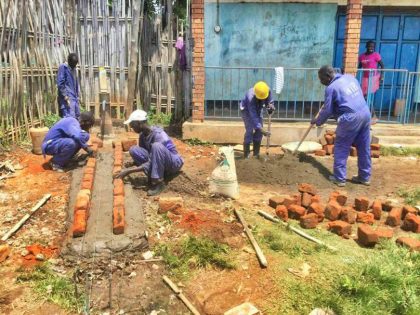
Project Impact
The well-restored at Kanjoro Community will benefit an average of 960 people who are working to rebuild their lives after experiencing much trauma and conflict.
Conclusion Report
The foundation of the Kanjoro Community well was reconstructed entirely with bricks and concrete. GI pipes were replaced as well as a new pump head. The Kanjoro Community well committee has many of its original members, and they are thrilled to have a functioning well once again. They have decided to begin once again collecting fees now that peace is returning and they have a greater sense of stability. The women in the community will once again have the time to focus on the other tasks that allow them to make an income and better care for the needs of their families.
The well restored at Kanjoro Community will benefit an average of 960 people who are working to rebuild their lives after experiencing much trauma and conflict.
